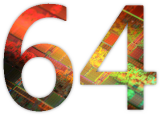Are we ready to go fully 64-bit yet?


It was over a year ago and we're in a new decade with new technologies, new outlooks and new aspirations.
After asking a good number of my friends, ranging from computing experts through their degree course or general geeks, to ordinary lay people who study psychology and film studies, only two out of around twenty have a 64-bit operating system on their compatible machine.
I suspect there is one big reason. Blame the industry.
The notebook and netbook industry is huge among the student population with the vast majority owning one for the portability and almost disposability of the devices at the price they come in nowadays.
Students want something cheap and cheerful to keep them going through at least the academic year. The vast majority of the time they spend their time on Word, iTunes, some kind of web browser, maybe Spotify if they're a music junkie, and an instant messenger - more often than not Windows Live Messenger because it's only a few clicks away to install.
Most of these notebooks or netbooks are supplied with relatively basic kit - an average processor, an all-right hard drive and 2GB of RAM more often than not. The only major advantage to 64-bit computers is that the operating system can support more than 4GB of RAM.
The benefits of 64-bit technology is that you can still run most 32-bit applications but many applications offer 64-bit versions which allow more memory to be consumed and general better-running of the program. But 16-bit applications are not supported and simply don't run. Granted, the chances are of running a 16-bit application nowadays are slim, but as an advanced BlackBerry user, there are some out there still which I need.
I needed a fresh, student perspective. I asked my old friend Bryant Zadegan who runs the reincarnated AeroXP site, winJade.net:
"x64 operating systems are relatively standard on any new laptop with 4GB RAM or more. To the average student, whether the laptop is running an x86 or an x64 operating system doesn't matter. It's generally a transparent process for most end users, which is likely why there aren't too many students specifically asking to have an x64 operating system on their laptops."
I then took the chance to speak to my good friend Elliot Harrison, former Neowin writer and stand-in for me here on this blog. He converted from Mac to Windows only a few months ago after being a die-hard Apple user, and recently switched from 32-bit Windows to 64-bit Windows to take advantage of the 4GB RAM "trick":
"Upgrading to an x64 bit operating system was an absolute must for me. I have a computer with 4GB RAM and a 1GB graphics card, but the extra gigabyte which before remained dormant can now be used to better process applications upon the operating system. It might not seem like much of a gain, but it is a gain nonetheless and I have noticed the difference. The speed of processes has increased and provides me with a better computing experience.
The upgrading process was not particularly easy with hundreds of gigabytes of data to back up and keep safe; granted Windows Restore did the job nicely with a separate backup on an external drive. However, the stress is very much worthwhile if you've got a PC with amazing hardware lying dormant. Third-party applications are still fairly few and far between, however if it is just everyday computing users of a x64 bit operating system should be fine."
I suspect the lack of drivers still, after a year and a half after writing my first 64-bit themed post, according to one of my friends who has an up to date 64-bit system, is still a major draw back in restricting students from going to the "other side".
I do however believe that once Microsoft takes the step in going fully 64-bit in their offerings of operating systems, others will follow suit and 64-bit drivers will be more available than 32-bit drivers. That is my hope, anyway.
Would you go to 64-bit now? Are today's students ready to switch over to the "other side" or will it take a good couple of years yet? Have you say.